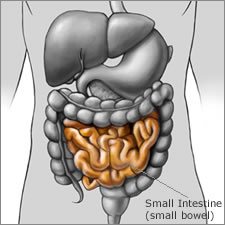Celiac Disease

Celiac disease is an autoimmune disorder where the small intestine is damaged after exposure to gluten in food or other gluten containing products. Celiac disease affects both adults and children and is also referred to as celiac sprue, nontropical sprue, and gluten-sensitive enteropathy.
Gluten is a protein found in wheat, barley and rye. When a person with celiac disease eats gluten containing food or products, their immune system reacts by attacking the lining of the small intestine responsible for absorbing nutrients from food. As a result, people with celiac disease may develop a variety of nutrition related disorders such as iron deficiency anemia, low blood sugar, infertility, bone diseases, and even some types of cancer.
Celiac disease is a chronic digestive disease that affects about one percent of otherwise healthy people in the United States. People who have close relatives with celiac disease or have Type 1 Diabetes have a higher than normal risk of developing the disease. It is estimated that 97 percent of the approximately 3 million people in the USA currently living with celiac disease are undiagnosed.
Symptoms
There are literally hundreds of symptoms related to celiac disease, and the symptoms can be vastly different from person to person. Some people experience bloating and diarrhea, while for others the first symptoms may be infertility or an iron deficiency anemia that is difficult to treat.
Children often show signs of growth rate abnormalities along with irritability, chronic diarrhea or constipation, bloating, abdominal pain and fatigue.
Common symptoms that may indicate celiac disease are:
- Abdominal bloating and pain
- Diarrhea or constipation
- Nausea and vomiting
- Decreased appetite and weight loss
- Pale, foul-smelling stool
With time, other nutrient deficiency related symptoms may also appear:
- Bruising
- Fatigue
- Depression or anxiety
- Failure to thrive in children
- Mouth ulcers
- Nosebleeds
- Itchy skin
Diagnosis
Screening for celiac disease usually begins with an antibody blood test. Genetic testing may also be used to determine if genes that are necessary to develop the disease are present.
If screening tests suggest that celiac disease is likely, a definitive diagnosis is made by taking several tiny tissue samples or biopsies from the small intestine using endoscopy. These samples show changes in the small intestine that indicate celiac disease.
Treatment
There is currently no cure for celiac disease, but it can be controlled by following a gluten-free diet. Following this diet will, in most cases, ease symptoms and promote repair of the intestines as well as preventing further damage.
A gluten-free diet is a lifelong commitment and initially may present a challenge. However, continuing to eat even a small amount of gluten can cause irreparable damage to your body and increase your risk for developing other autoimmune disorders and associated problems.
As part of your treatment for celiac disease, you will meet with a dietitian who has extensive knowledge about your condition. Your dietitian will provide you with a list of foods that you can eat and those that you must avoid. He or she will also provide you with sample recipes and will show you how to deal with dining out in restaurants and other social situations.
Because changing your lifestyle to deal with your disease can be difficult at first, there are many support groups available that you may find useful as you learn to adjust.


